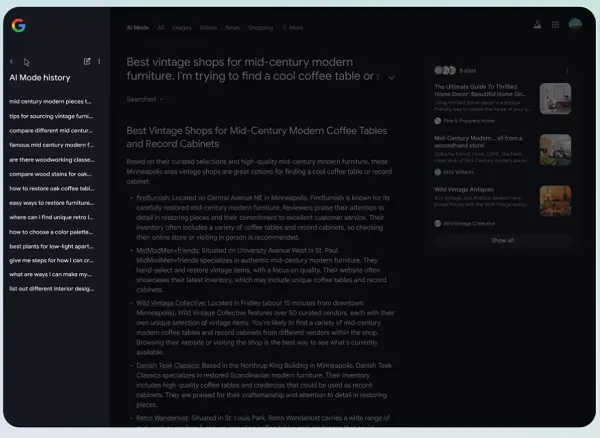Google Joins the AI Chatbot Race with New Search Interface
Just as platforms have spent recent years chasing the short-form video trend, the spotlight is now shifting to AI chatbots. Google is the latest to jump in, introducing a ChatGPT-style experience within its Search platform—aiming to ride the wave of growing user interest in conversational AI tools.

s you can see in this example, Google’s “AI Mode” in Google Search enables you to take a more conversational approach to web discovery, with a ChatGPT-like UI, that you can converse with like a know-it-all human.
ALSO READ: How to use Pixel Studio to make AI images
Google began testing its AI Mode with approved testers back in March, and it’s now expanding access to all Google Labs users in the U.S.
As per Google:
“Millions of people are using AI Mode in Labs to search in new ways – asking longer, harder questions, using follow-up questions to hone in on what they really want to know, and discovering new websites and businesses along the way. Based on the incredibly positive feedback we’re getting, we’re removing the waitlist so anyone in the U.S. can now get immediate access to AI Mode in Labs.”
Google Expands Access to Gemini-Powered AI Search Responses
Interest in Google’s AI-generated answers—driven by its evolving Gemini AI—has been strong enough that the company is now opening up access beyond its Labs testers. In the coming weeks, select regular users in the U.S. will begin seeing AI-powered responses directly in Search.
This move follows a broader trend, with Meta recently launching its own dedicated Meta AI app, and X introducing a standalone Grok app, both offering chatbot-style interactions.
Generative AI is quickly becoming a central tool in online discovery. Interestingly, Meta CEO Mark Zuckerberg noted that many users are engaging with Meta AI more like a conversational partner—using it as a sounding board rather than just a search assistant.
As per Zuck:
“Already, one of the main things we see people using Meta AI for is talking through difficult conversations that they need to have with people in their lives; ‘I’m having this issue with my girlfriend. Help me have this conversation,’ or, ‘I need to have a hard conversation with my boss at work, how do I have that conversation?’ That’s pretty helpful. As the personalization loop kicks in and the AI starts to get to know you better and better, that will just be really compelling.”
AI Tools Are Evolving, But Context May Define Their Roles
Google’s integration of Gemini AI into Search appears focused on utility and discovery. By pulling in product data from Google Shopping, the system aims to help users find relevant items more efficiently, positioning it as a practical, search-first experience.
That stands in contrast to how other platforms are positioning their AI offerings. For instance, ChatGPT has become deeply personalized for many users, who’ve fine-tuned it to their preferences. This creates a level of attachment that may make them less likely to shift to alternatives like Meta AI.
Meta’s AI, meanwhile, is being shaped as more of a conversational companion—consistent with how users already interact on Facebook and Instagram. Meta CEO Mark Zuckerberg recently noted that people are using it more for dialogue and feedback than direct information retrieval.
These distinctions highlight how context matters. Google’s AI is designed to help you find things. Meta’s may feel more like something you talk to. And X’s Grok could carve out its own niche—possibly for real-time or trending content, depending on user behavior.
Ultimately, the AI that adapts best to individual preferences may win the long game. In theory, Meta has an advantage there, with deep access to users’ social activity. Google, by comparison, has struggled to deliver true personalization beyond search intent.
Still, it’s early. Google is enhancing AI Mode with new features like tappable product and place cards and a side panel that lets users pick up past searches. How people engage with each AI, and the types of questions they turn to each for, will likely shape future development paths.

t’s interesting to see how each app is approaching the AI shift, and the tools they’re development for such, and again, it’ll also be worth noting how people use each app, and whether they do start to merge their engagement towards one main AI tool.


Leave a Reply